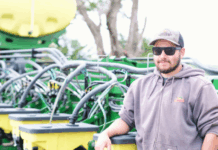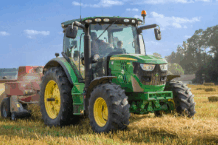GARDEN CITY, Kansas — The Finney County Emergency Medical Service department, with its staff of 23, is conserving its N95 masks and only using them when a patient is positive for COVID-19. Like large hospitals, U.S. cities and entire European countries, rural EMS workers aren’t shielded from the medical supply shortage.
And that’s just one of the challenges rural EMS agencies across Kansas stare down as COVID-19 is being confirmed in their communities. They’re stretched thin, covering hundreds of miles, and seeing the ripple effects from the pandemic that’s shut down communities — something emergency plans hadn’t accounted for.
All of Kansas’ 105 counties have mutual aid agreements: If fire or EMS departments need backup, other counties step in to assist. Those may be the support that holds emergency services together in the coming months.
There are more than 1,300 licensed volunteer EMS workers in Kansas, making up nearly 14% of the state’s EMS workforce, according to Joe House, the executive director of the Kansas Board of Emergency Medical Services.
It’s something that’s on the mind of Andy Gienapp, the president-elect of the National Association of State EMS Officials and Wyoming’s state EMS director.
“How far can we push them to continue to donate their services to a major aspect of health care?” he said. “EMS is the only segment of health care that relies so heavily upon a volunteer workforce.”
In Louisiana, rural EMS workers may run out of personal protective equipment this week. Considering the number of cases continues to rise in the state — more than 6,400 as of April 2 — the situation is critical, said Donna Newchurch, CEO for the Louisiana Rural Ambulance Alliance.
“In some rural communities, EMS is the only health care system,” Newchurch said. “In some parishes in Louisiana, there’s no hospital at all, and when the (federally qualified health center) closes or the rural health clinic closes or the doctor’s office closes, EMS is the entire health care system.”
Every parish that can spare an ambulance has sent them to areas of the state in need, she added.
Already in rural Kansas, an ambulance ride for a patient with a critical condition can take several hours. In Finney County, one ambulance is dedicated to transporting people up to 250 miles away, but the Service Director of Finney County EMS, Skylar Swords, said it requires staff to leave the county.
“I don’t have a dedicated transfer team. So when we do take a transfer, even before all this happened, and then we go down one ambulance,” Swords said. “Now that that all is subject to change — fortunately I don’t have any staff issues right now.”
Gear and personnel shortages
Before Finney County had a confirmed case of COVID-19, 911 dispatchers were asking patients a series of questions before an ambulance arrived.
Swords said if patients hadn’t traveled and didn’t have a fever or cough, EMS workers would wear standard personal protective equipment. EMS workers will only wear N95 masks if the patient tests positive for COVID-19.
“We have to just trust that people are being honest with us and … PPE is very limited,” Swords said. “Right now … 95 masks and the gowns are extremely difficult to procure.”
After Sept. 11, Swords said efforts were made to store personal protective gear. But those stockpiles are outdated.
“If I have 10,000 masks, and I’m throwing 10,000 masks away every five years or something like that because they’re outdated, then … that’s just a financial waste,” he said. “So we’re trying to find solutions that will help us be prepared in the moment without just constantly throwing stuff away.”
Because fewer people live in rural communities, a community taxbase doesn’t always provide enough funding for EMS departments. Low wages can often push EMS workers into better-paying health care jobs.
“We do lose a lot of quality technicians to the nursing field because of pay usually,” Swords said.
When more EMS workers are needed, people will step up, House said. He said one measure will allow medics with expired certifications to work for up to 30 days.
“I’ve got 140 people willing to deploy anywhere in the state, to assist services (and) maintain that crucial staffing that (EMS) need(s),” House said.
Gienapp added that there’s an overall lack of federal funding for emergency medical services. After 9/11, a lot of that aid went to police and fire departments.
“The evidence of that shows up now,” he said, “and I don’t think we did everything we could have as a nation to prepare our nation’s emergency medical system to be ready to handle something like COVID-19.”
Swords agreed, saying that statewide, plans aren’t where they need to be.
“I guess the benefits, if you want to call it that, of this pandemic is we’re getting some real world experience with these plans.” he said.
Extra stress on rural hospitals
In addition to concerns over adequate supplies and EMS technicians, COVID-19 is taking a toll on rural hospitals.
Dr. Ronald Robinson, who is the CEO of hospitals in Atwood and Goodland, said routine surgeries and visits are suspended, which means it has lost revenue.
“If you have an office visit, we’ll bill the insurance company,” Robinson said. “So, the cash actually doesn’t show up for us for a month and half.”
Robinson said the Goodland hospital has enough cash to operate through Aug. 23. He added in an email: “We’re not going to allow the hospital to run out of cash, and are taking aggressive steps to bring our expenses in line with our revenues.”
And when patients with severe COVID-19 symptoms need hospitalization, it’ll increase the stress on rural hospitals. Approximately half of the counties in the U.S. do not have ICU beds.
That’s the case in Wilson County in southeast Kansas. It has just 15 beds and one ventilator. Once those are full and it’s ventilator is in use, patients will need to be treated at larger hospitals.
“We’re also having to work with our local EMS agency because they may be transporting some of these patients as they come in to get them trained and up to speed on taking ventilated patients to other facilities if we have to do that,” said Joseph Meier, a physician at Wilson Medical Center. “Which is just adding to all of the stuff that we’re having to prepare for down here.”
(Kansas News Service)
www.ksnewsserrvice.com



